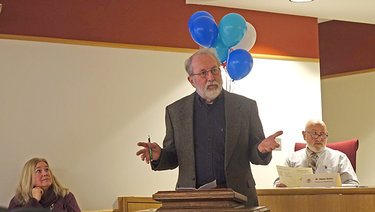In a town where some of the same families have been friends for generations, Knox celebrates its bicentennial
KNOX — From its perch atop history, the town of Knox celebrated its 200-year anniversary this week with a proclamation ceremony, which featured speakers like Supervisor Russ Pokorny, State Senator Michelle Hinchey and Knox resident Albany County Legislator Jeff Perlee.
Several dozen people attended the event, held at the town hall on Feb. 28 — the same day the town came into being in 1822.
Leading the ceremony was Knox Historical Society President and Town Historian Dennis Barber, who delivered a lecture on the area’s history (“Five pages, 200 years — bear with me,” he joked with the audience) before introducing the various speakers.
Barber also noted that several members of the audience belonged to families who had deep roots in the town, including some whose names appeared on the first map of the area: the Abbotts, Browns, Whipples, Gallups, Franks, and Baxters, among others.
Before the original German Palatine settlers arrived in Knox in the mid-1700s, the land was home to Algonquin and Iroquois tribes, and, according to the town’s comprehensive plan, “Prior to 1790, the Town was known only as a wild, mountainous part of the West Manor of Rensselaerswyck,” referring to the Dutch patroon Stephen Van Rensselaer, who apportioned plots of land to settlers under a feudal system.
Barber said the town was established by the New York State Assembly in 1822, through the Act to Divide the Town of Berne in Albany County, and named after General Henry Knox, who, after his command in the Revolutionary War, had been named the United States’ first secretary of war by George Washington, to whom he had been a close advisor.
The comprehensive plan points out that the town’s earlier name may have been Fechtburg, or Fighting Hill, derived from “a bitter dispute over leadership among a party of pioneers encamped at the site of the Hamlet,” at least according to legend.
“Most people were farmers growing crops,” Barber said, “such as winter wheat, oats, corn, potatoes, tobacco, apples, and barley,” adding that, in 1874, there were “874 cows, 644 horses, and 4,100 sheep.”
Forms of industry included sawmills, blacksmith shops, harness-makers, a grist mill, shoemakers, a few doctors, and “one lawyer,” Barber said, in addition to the town’s claim to fame — pillbox makers.
The pillbox industry lasted in Knox from 1806 to 1906, Barber said, and, in that century, “local families would make approximately 60,000 pillboxes each year.”
In 1850, the town had its first one-room schoolhouse; by 1886, the town had 13 schools, Barber said; teachers were paid $13 per month. Two of the school houses still stand: One is where it was built on Ketchum Road, in Knox, and the other, built along the Bozenkill, was moved to the Altamont fairgrounds, in Altamont.
The town also used to be home to hotels, restaurants, and bars.
“Today, I would describe Knox as a bedroom community,” Barber said, “because most people work off the Hill and do their shopping on their way home from work. With the invention of the automobile, the town no longer had to be self-sufficient … Knox is, and always has been,” Barber concluded, “a great place to grow up.”
Dignitaries
Supervisor Pokorny, speaking after Barber, provided a sense of what the world was like at the time of the town’s incorporation (the Pledge of Allegiance hadn’t yet been written, Beethoven was still composing, and James Monroe was president) as well as where it stood in relation to other, larger historical events like the invention of the automobile, the Civil War, and the availability of 9-1-1.
Pokorny also mentioned that, as supervisor, a large percentage of his time is spent on the phone, on hold, and waiting for log-in passwords for computer programs. Referring to Knox,’s 19-Century supervisor, Pokorny said, “So that brought me to thinking that Malachi Whipple didn’t have these problems.”
He went on to describe what an early Knox meeting may have been like: “They probably would have had to have a wood stove going, and anybody who came to the meeting probably came on horse. No Bluetooth, no heated seats … They were really out in the weather. So, in conclusion, I would say, as Dennis already did, after 200 years, I think this is a really great place.”
A representative from Congressman Paul Tonko’s office gave a proclamation on Tonko’s behalf, which briefly summarized the town’s history and significance.
In contrast to Pokorny’s temporal focus and Tonko’s re-rendering of history, Hinchey’s proclamation highlighted the town’s cultural heritage.
“Whereas it’s the duty of the state senator to honor and recognize the important milestones for counties across our region that preserve the character, legacy, and rich history of upstate New York,” Hinchey read from her proclamation. “... Whereas, overall, it’s these unique places and individuals of the town who make it a truly special place, worthy of recognition and celebration, I hereby proclaim that I, New York State Senator Michelle Hinhcey, commemorate the town of Knox upon the celebration of their bicentennial.”
Westerlo Heritage Museum Director Mary Jane Araldi also spoke, reading a letter to the town written by Westerlo Supervisor Matthew Kryzak, who was not in attendance.
“Since your founding, America struggled through a Civil War and thrived during industrialization,” Kryzak wrote, in part. “The town weathered the Great Depression, two World Wars, and COVID-19. Along the way, your community played a role in shaping our shared history and helped make our union what it is today.
“In the decades to come, our towns must continue to join together in times of trial and triumph to expand opportunity to anyone willing to work hard and to pursue greater understanding among all people. As we move forward, we must remain steadfast in the ideals upon which America stands, and let us draw strength from our forebears as we build an even brighter tomorrow.”
One of the most touching speeches came from Perlee, who was born and raised in Altamont but now lives in Knox with his family. After delivering a brief overview of his heritage, which goes back to Henry Dennison, who was a lieutenant in the Revolutionary War, Perlee recalled a time he noticed the continuity of past, present, and future.
“Last fall, we were at a party … and I noticed that my kids were playing on a swing set with Henry Whipple’s grandchildren. And our great-great — I won’t even count the number of greats — came from Connecticut together, and those two families have been friends for over 200 years. And there was 4-year-old kids playing on the swingset in Knox, enjoying the same quality of life that we treasure. And if we do our job right, hopefully, God willing, there’ll be 10 or more generations in the future that will enjoy that quality of life.”


